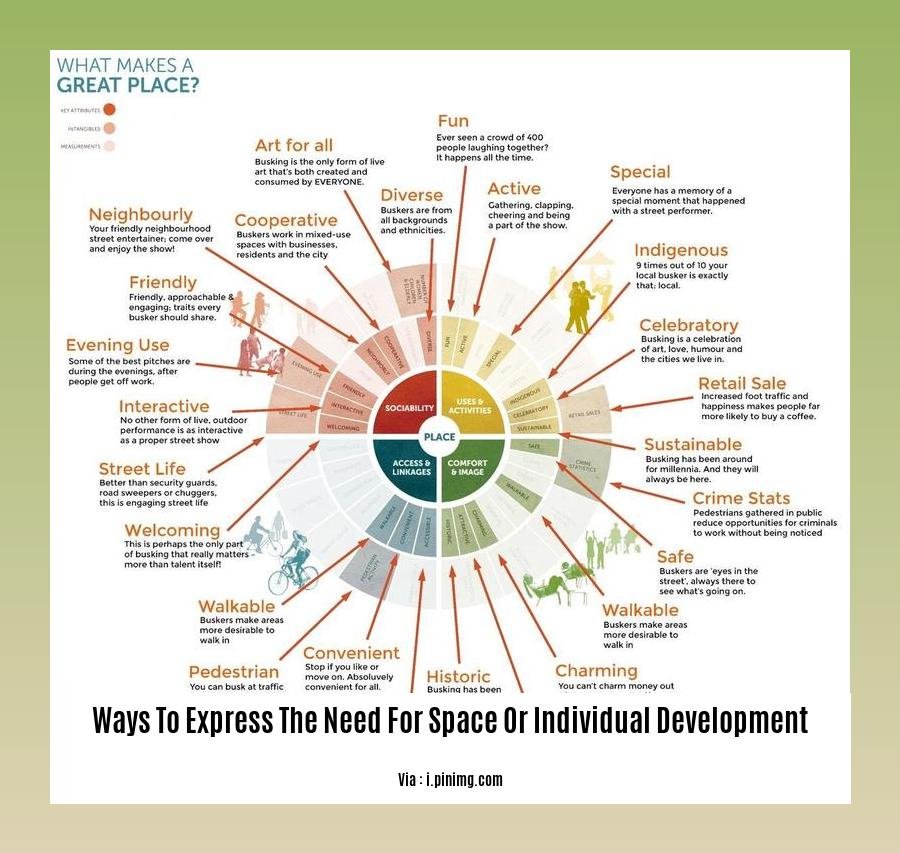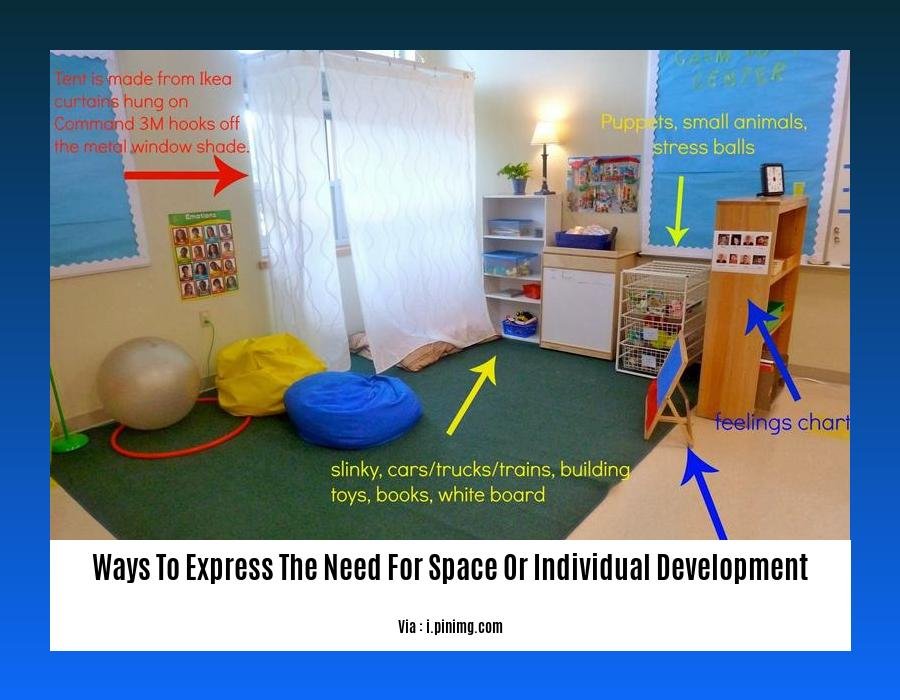In the intricate dance of relationships, the delicate balance between interdependence and solitude is crucial for personal growth and well-being. Expressing the need for space or individual development can be a challenge, but it is an essential conversation for maintaining healthy and fulfilling relationships. In this article, we explore effective ways to communicate your needs for space and individuality, empowering you to navigate this conversation with clarity and empathy.
Key Takeaways:

- Prioritize self-care and meet your needs.
- Encourage holistic development by considering physical, emotional, and mental well-being.
- Learn from experiences but don’t dwell on past limitations.
- Avoid comparing yourself to others and focus on your unique journey.
- Establish healthy habits to support gradual growth.
- Develop skills for personal development, such as identifying areas for improvement, cultivating a growth mindset, and enhancing coping mechanisms.
Ways to Express the Need for Space or Individual Development
Expressing the need for space or individual development in relationships can be a delicate yet crucial aspect of maintaining healthy dynamics. Here are some effective strategies to convey your desire for personal growth:
Communicate Openly and Honestly
A foundation of transparent communication is key. Choose a time when both partners are calm and receptive. Explain your need for space or time alone, emphasizing that it’s not a reflection of your love or commitment.
Set Boundaries
Establish clear boundaries to define the time and activities you require for yourself. Discuss how much alone time you need and set aside specific periods for solitude.
Schedule Designated “Me Time”
Allocate non-negotiable slots in your schedule for personal activities, hobbies, or simply quiet reflection. Communicate these times to your partner and stick to them.
Practice Self-Care
Self-care is not selfish but essential for your well-being. Engage in activities that nourish your mind, body, and spirit. Whether it’s reading, exercising, or indulging in a hobby, make time for these rejuvenating practices.
Find Common Ground
Seek activities that allow for both togetherness and solitude. Suggest activities that cater to each partner’s individual interests, ensuring both parties feel fulfilled.
Suggest a Couples Retreat
A couples retreat can provide a structured environment for open communication and reflection. A neutral third party can facilitate discussions and help navigate potential challenges.
Encourage Personal Growth
Support your partner’s personal growth and encourage them to pursue their own goals and interests. Respect their need for space and time to develop as individuals.
Listen Actively
When your partner expresses their need for space, listen attentively and validate their feelings. Avoid interrupting or dismissing their perspective.
Remember the Importance of Balance
While it’s important to express your need for space, it should not undermine the foundation of your relationship. Balance is key, so make sure to allocate ample time for connection and shared experiences.
Discover expert tips and strategies for communicating your desires for personal growth within relationships. This insightful article empowers you to navigate conversations and foster a supportive partnership.
When you feel stunted or held back in a relationship, proactive steps can make a world of difference. Explore tips for addressing this common challenge and regain a sense of progress and fulfillment.
As personal interests evolve, it’s essential to have open and honest discussions about these changes. Learn how to raise discussions about evolving personal interests to maintain a strong and dynamic connection with your partner.
Prioritize Your Own Needs
Prioritizing our own needs is a crucial aspect of maintaining healthy relationships and personal well-being. When we neglect ourselves, we deplete our resources and diminish our ability to fully engage with others. By setting appropriate boundaries and practicing self-care, we empower ourselves to flourish both individually and within relationships.
Key Takeaways:
- Embrace Practical Self-Care: Make self-care a regular part of your routine. Indulge in activities that nourish your mind, body, and spirit.
- Nourish Your Body: Fuel your body with healthy foods, prioritize quality sleep, and engage in regular exercise.
- Set Clear Boundaries: Learn to decline requests that exceed your limits or interfere with your well-being.
- Listen Actively to Yourself: Tune into your feelings and emotions. Honor your needs and desires.
- Write or Journal: Express your thoughts and emotions through writing to gain clarity and self-awareness.
Remember, prioritizing your own needs is not selfish. It’s essential for maintaining healthy relationships, protecting your well-being, and living a fulfilling life.
Citation: Calm Blog: How to Focus on Yourself More and Prioritize Your Own Needs
Practice Self-care
Taking time for practice self-care is crucial for nurturing your overall well-being. It encompasses actions that nourish your mental, physical, and emotional health. Simple gestures like replenishing your body with vitamins and hydrating yourself contribute to practice self-care. Regular activities like journaling, embarking on a rejuvenating walk, or connecting with loved ones can enhance your sense of fulfillment and refocus.
To fully integrate practice self-care into your routine, consider setting up a dedicated schedule and adhering to it as much as possible. This discipline will support your journey towards prioritizing your needs and promoting your overall well-being.
Key Takeaways:
- Prioritize practice self-care to boost your well-being.
- Incorporate practice self-care into your daily routine.
- Engage in activities that enhance your mental, physical, and emotional health.
- Establish a practice self-care schedule for optimal results.
Most Relevant URL Source:
Seek support from a trusted source
If you’re struggling with mental health issues, it’s important to seek support from a trusted source. This could be a friend, family member, therapist, or other mental health professional. Here are a few ways to ask for help:
- Be direct. Tell the person that you’re struggling and that you need their support.
- Be specific. Let them know what you’re struggling with and what kind of support you need.
- Be honest. Don’t try to downplay your symptoms or pretend that you’re fine.
- Be patient. It may take some time for the person to understand what you’re going through and how they can help.
Remember, you’re not alone. There are people who care about you and want to help you get better. Seek support from a trusted source today and start on the path to recovery.
Key Takeaways:
- Asking for help is a sign of strength, not weakness.
- If you’re struggling with mental health issues, it’s important to talk to someone you trust.
- There are many different ways to get support, so find something that works for you.
- Remember, you’re not alone.
Most Relevant URL Source:
“7 Ways to Ask for Emotional Support.” Psychology Today, Sussex Publishers, LLC, 31 Aug. 2015, www.psychologytoday.com/us/blog/mental-health-from-the-trenches/201508/7-ways-ask-emotional-support.











